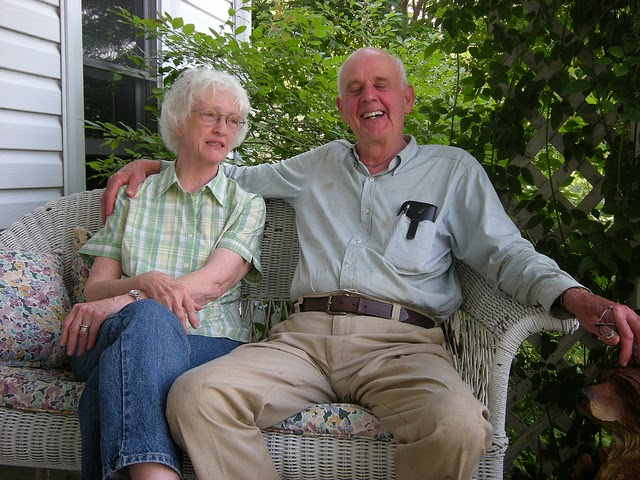 |
| Tanya & Wendell Berry Photo by Ann Thompson via Flickr |
Becoming a good steward of the earth involves learning to live, love, and tend with the land, not over or against it. It's about identifying the rhythms of life, health, and beauty already at work in nature, and partnering with it in our human culture-making, through which we create the stuff and meaning from the world we inhabit and use (channeling Andy Crouch's thinking on culture here).
And it's not a question of whether we do this culture-making and use of the world (or our relationships, such as marriage), but how, which reflects our moral character. Meador isolates what he thinks might be the heart of Berry's vision and purpose for writing as he does, with a quote from The Gift of Good Land:
“To live, we must daily break the body and shed the blood of Creation. When we do this knowingly, lovingly, skillfully, reverently, it is a sacrament. When we do it ignorantly, greedily, clumsily, destructively, it is a desecration. In such desecration we condemn ourselves to spiritual and moral loneliness, and others to want.”So it goes in creation, so it goes in marriage.
Meador briefly points out another thread in Berry's work that sometimes factors into the marriages of his characters: debt. I'm currently reading through his seminal book of essays, The Unsettling of America. There he's lamenting the impact of the agribusiness/"go big or get out" movement in agriculture that was just gaining traction in the mid-70s when the book was written, and how debt was a huge part of the negative consequences, which drove many small farmers either away from farming or into bankruptcy and then away from farming.
And it's that debt bit in Berry that gnaws at me, personally. Meador summarizes some of Berry's novel, The Memory of Old Jack:
Before it is anything else, marriage is an act of giving. And what we see in Jack and Ruth’s relationship is that neither of them is able to give themselves as they are to the other. Rather, Ruth loved the idea of what she might make of Jack, seeing him less as a living being to whom she would give herself and more as a project to be repaired and made into something more respectable and urban...
Jack, for his part, was so taken by Ruth that one part of him desired to become the man she wished him to be. And so the marriage falls apart for eminently predictable reasons. Fueled partly by his own vanity and partly by a desire to become the man Ruth wishes him to be, Jack buys land he can’t afford and can’t maintain on his own. Over time his folly is exposed and he is forced to sell the land at great loss. Then when a fire destroys his barn and many of his animals, Jack is forced to take on a new mortgage to pay for the damages and labors under the burden of debt—which carries a lot of symbolic meaning in Berry’s fiction—for about another 20 years. A good man is ruined and his ruin begins with the withholding of love that ought to have defined his marriage.This is haunting to me for reasons I can't explore here, and it brings to mind another passage on marriage, this one from Jayber Crow:
I saw...how marriage, in bringing two people into each other's presence, must include loneliness and error. I imagined a moment when the husband and wife realized that their marriage includes their faults, that they do not perfect each other, and that in making their marriage they also fail it and must carry to the grave things they cannot give away.What's compelling to me about Berry is his agrarian vision for human and creational flourishing. What's troubling to me about Berry is just how far from the tree I fall in terms of the kind of character it takes to flourish. Much to ponder here...
No comments:
Post a Comment